Perinatal mental health: 'I wanted to abort my IVF baby'
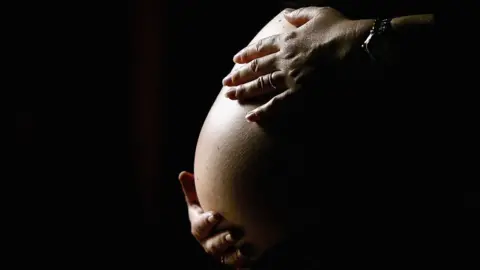 Getty Images
Getty ImagesFor many women, pregnancy is a magical time. But for some it can be a struggle, with one in five mothers suffering mental health issues before and after giving birth. What's it like when the experience isn't all you hoped?
'I wanted to terminate'
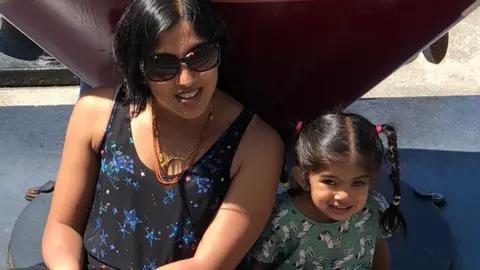 Joshna Mavji
Joshna MavjiJoshna Mavji and her husband Sanjay struggled to conceive naturally and got pregnant through IVF.
But when she became ill with hyperemesis gravidarum - severe morning sickness - she was admitted to hospital.
The experience left her feeling like it was a "bad sign".
"For this to happen, it felt like something telling [me] this was not meant to be," said the 34-year-old doctor.
"I was sick constantly, in and out of hospital. It was physically and mentally draining, so I put my feelings down to that."
Joshna said she had wanted her "miracle" IVF baby for so long she felt additional pressure to have a "perfect" pregnancy.
But after almost three months of sickness, she felt she couldn't carry on.
"I spoke to a consultant and said I can't continue with the pregnancy. I'd had enough.
"Because she had been involved in the IVF referral, she couldn't understand how I had been so desperate for a baby and now I wanted to terminate.
"I felt pathetic, stupid."
 Joshna Mavji
Joshna MavjiShe went to her GP and was referred to the mental health crisis team which prescribed her anti-depressants.
But after the birth, her depression returned, along with panic attacks.
She eventually confided in her baby yoga teacher, who put her in contact with Acacia Family Support, a Birmingham-based charity supporting those with pre and postnatal health problems.
"I felt like people would look at me and say, why should you be feeling like this?
"You have everything: friends, a supportive family, a home, you have a good job, you're not a single mum, you have no reason to get ill.
"But Acacia never made me feel like that. It was my life-saver."
Joshna said she found pregnancy so difficult she and husband are considering adoption in the future.
"My experience first time around was too traumatic and I don't want to suffer in the same way."

You might also be interested in

'I thought I had poisoned my baby'
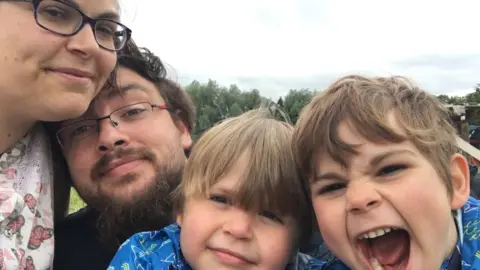 Louise Baker
Louise BakerLouise Baker said she had always been prone to anxiety but it was heightened during her two pregnancies.
She said she struggled with the huge responsibility of bringing her first baby into the world, worrying about "everything".
The 32-year-old from Derbyshire described how on one occasion, her anxiety spiralled to the point she became convinced she had poisoned her unborn baby through giving the cat its flea treatment.
"I was sure it would absorb into my bloodstream and kill the baby," she recalled.
"I lay awake on the nursery floor so I wouldn't wake my husband, crying because I had poisoned my baby.
"I felt wholly responsible, and utterly unprepared."
 Louise Baker
Louise BakerDuring her second pregnancy, a close relative lost a baby and Louise's anxiety resurfaced.
"I was almost feeling as though I didn't deserve the baby, [that] she would be a much better mother,
"I would look at other people who were expecting and I just hated being pregnant.
"I felt a fraud saying it because I had perfect pregnancies both times, but I hated pregnancy because of my mental state."
Ms Baker said it was a "lonely" time and after speaking to her midwife and health visitor, received counselling.
"I knew about post-natal depression but didn't know it was possible during pregnancy.
"It's twee to say a problem shared is a problem halved, but talking to someone can be a weight off.
"If you are feeling anxious, don't be afraid to ask for help. You're not the only person going through it."

Perinatal mental health
- About one in five women will experience perinatal mental health problems
- They can occur during pregnancy or within a year of giving birth
- The most common problems faced are depression, anxiety and obsessive compulsive disorder
- If left untreated, it can have significant and long lasting effects on the woman and her family
- In January it was announced more than £20m will be spent on services to help expectant and new mothers
- Treating perinatal mental health conditions costs £8.1bn
Source: NHS, Mind, The Maternal Health Alliance

'I was crying on the floor bleeding to death'
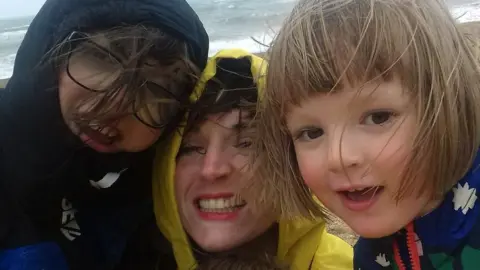 Charlie Francis-Pape
Charlie Francis-PapeCharlie Francis-Pape had mental health issues during each of her three pregnancies.
She was diagnosed with postnatal depression after the birth of her first daughter and post-traumatic stress disorder after her second, having given birth alone on the bathroom floor and losing four litres of blood.
When she became pregnant a third time, she was terrified.
"Every time a baby cried, in my head I was on the floor bleeding to death," she said.
"If I heard an ambulance, in my head, I was bleeding to death. If I saw a woman who looked like my midwife, I thought I was bleeding to death.
"I had flashbacks every day."
The 32-year-old told healthcare professionals about her fears and she soon had a counsellor and regular home visits from the midwife.
She said she wouldn't have been able to cope without their "incredible" care.
"There was no specific plan for people like me, they just went above and beyond," Ms Francis-Pape said.
The mother of three is now a student midwife and has developed a specialist perinatal mental health service in Dorset, which focuses on helping women with mental illness during pregnancy and after birth.
It also helps those with a history of severe mental illness who are planning a pregnancy, or who have become pregnant and are at high risk of relapse before or in the 12 months after giving birth.
She also runs a support group for women from pregnancy until their babies are one, to ensure women get tailored help as soon as possible.
Charlie said: "I don't want anyone go through what I went through.
"They will - it is not preventable; but what is preventable is not letting it get as bad."
'It doesn't discriminate'
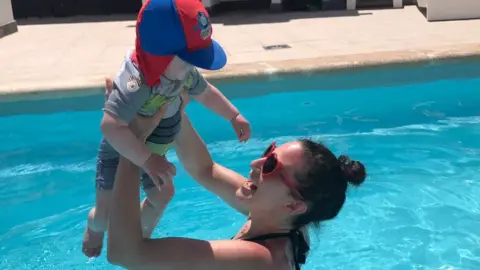 Laurie Hobson
Laurie HobsonLaurie Hobson said she felt she should have known how to handle her perinatal anxiety due to her work as a clinical psychologist.
But she said it had "skewed" her perception of pregnancy and she found herself worrying.
"As soon as I got pregnant, I was worried things weren't [developing] as they should be," said the 34-year-old, who is from Northampton.
"Looking back now, I think I was 'hyper-vigilant' to perceived risks like an ectopic pregnancy or reduced foetal movements.
"[When] my son had lots of hiccups, I had concerns he may have the cord wrapped around his neck."
She paid a "very tearful" visit to her GP, but was told she didn't have depression and was just "putting too much pressure on herself".
But her symptoms worsened and after the birth she developed obsessive compulsive disorder and post-natal depression with psychotic symptoms.
"That first year can be so difficult. There's the perception that you should love every minute of it, but that's just not really the reality for a lot of people," she said.
"Undoubtedly, there is still stigma surrounding mental health difficulties but I think in my case it highlighted the assumptions that people hold about who might become unwell.
"People were surprised that I became unwell and I was missed by the GP.
"I suppose being a psychologist didn't fit with those assumptions - however, the reality is that mental health does not discriminate."
For information on how to find mental health support, visit the BBC advice pages.
